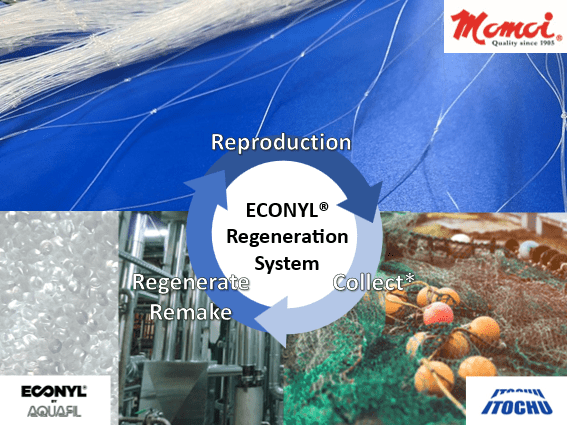Development of Fishing nets made from recycled nylon and establishment of mass production system
~ Chemical Recycling project by three companies~
Momoi Fishing Net Mfg. Co., Ltd., (headquartered in 1576-5 Nakahiro, Ako City, Hyogo: Kazumitsu Momoi, President & CEO; hereinafter “MOMOI”), ITOCHU Corporation (headquartered in Minato-ku, Tokyo; Keita Ishii, President & COO; hereinafter “ITOCHU”) and Aquafil S.p.A. (headquartered in Italy; Giulio Bonazzi, CEO; hereinafter “Aquafil”) have successfully commercialized fishing nets made of 100% chemical recycled nylon “ECONYL® resin”. MOMOI will aim to increase the recycling rate of our products, fishing nets and fishing lines.
■Background
The plastic wastes lost into the ocean from fishing industry, approximately 1.15 million tons every year, is becoming a social issue all over the world (*1). Under such circumstances, the development of environmental friendly products and the efforts to recycle marine waste such as discard of fishing equipment are required in order to realize a sustainable marine environment. In addition, restraining the emissions of CO2 by reducing the use of petrochemical raw materials is one of the most important issues facing the world today. To save the rich blessing of our sea, river, lake and the global environment itself and pass them on to the next generation, we started this project to establish “a loop” of recycle from discarded fishing nets to new nets in the world of fishing nets.
■Fishing nets made of ECONYL® regenerated nylon
“ECONYL®” is a 100% waste-derived chemical recycled nylon produced by Aquafil’s through a chemical recycling technology. ECONYL® is created by depolymerizing discarded nylon 6 returning to the monomer ε-caprolactam, which is polymerized again. Compared to petroleum-based nylon production, ECONYL® material can reduce the emissions of CO2 by up to 90%, and is used as the preferred sustainable ingredient for products such as clothing, bags, and carpets. On the other hand, recycled materials have not been widely used in fishing nets until now because of their unsatisfactory strength and durability. However, now we developed fishing nets that are made 100% from ECONYL® resin by integrated production in MOMOI from extruding, knitting to commercializing. That is to say, “fishing net made by 100% ECONYL®” which is not a blended material, but the same quality and performances and the virgin ones is completed. This means that our fishing nets made from ECONYL® resin have the same quality (strength, elongation, and appearance) as existing products, and now we have a capability of production system that allows for mass production.
In collaboration with ITOCHU, which has been working with Aquafil for some time to expand the nylon recycling business, MOMOI will make a great effort on collecting nylon waste in various regions around the world, particularly on the wastes of fishing nets. By collecting discarded fishing nets from around the world, we would like to contribute to the reduction of plastic run off into the oceans and increase the supply of ECONYL® fishing nets.
The purpose of the project is to reduce petroleum-derived nylon materials and CO2 emissions and to promote the yet-to-be-popular waste fishing net recycling business by having the three companies working together in the flow below;
collect wastes of nylon including discarded fishing nets → produce ECONYL® resin → Commercialize again as fishing nets made from 100% ECONYL®.
【Image of three companies’ collaborative recycling business】

*ECONYL® is made from a variety of nylon 6 waste, not only fishing nets.
■MOMOI’s vision to cope with environmental issues
Based on our basic philosophy of “continuing to grow together with the development of the world’s fisheries,” MOMOI has long been a pioneer in the global market, manufacturing fishing nets that are in demand by fishermen in the world’s oceans in a timely manner. We will leverage these global connections to manufacture and expand the sales of fishing nets made entirely from ECONYL® resin. We will contribute to the development of oceans with abundant marine resources by working on decarbonizing fishing nets together with people involved in the global fishery.
*1 Quoted from the Fisheries Agency, “Situation and Measures Concerning Marine Plastic Waste Problems in Fisheries.



